Middlesbrough Collaboration: An evaluation of our co-produced grant fund for women and children
- Published
- 02/10/2024
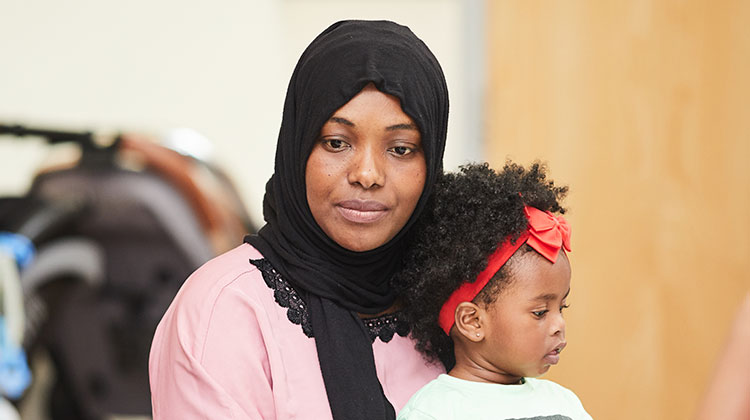
5. What did we learn and what will we do differently?
1. Introduction
Buttle UK, The Smallwood Trust, and Turn2us are charitable organisations that are united in providing grants to individuals.
Between 2020 and 2021 we had many conversations wondering what more we could be doing as grant makers to end poverty and explored some potential collaborations.
A Programme Steering Group was set up, comprising two representatives each from Buttle UK, the Smallwood Trust, and Turn2us. This group oversees the strategic direction of the programme and serves as the foundation for collaboration between the three grant makers.
The Steering Group agreed to the shared principles of co-production, honesty, accountability, partnership working, commitment to intersectional feminist values, and shared decision-making. The goal was to test whether this collaborative and co-produced approach could effectively transform the lives of women and their children.
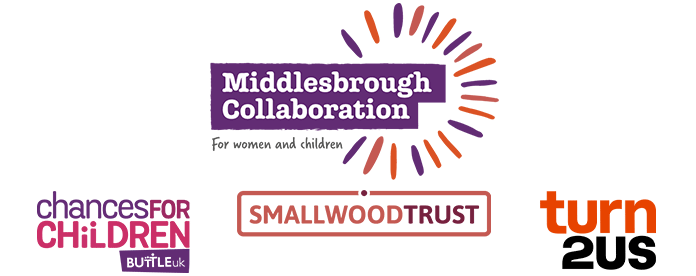
The collaboration resulted in a three-year, £1 million, collaborative programme in Middlesbrough, starting in 2022.
The Middlesbrough Collaboration aims to:
- Shift power to people worst impacted by gendered poverty and work to end gendered poverty.
- Develop the programme using coproduction techniques so that the voices and experiences of the women and their children, who face issues created by gendered poverty, inform and shape the programme.
- Deliver the programme with and to communities of the most marginalised women and their children.
- Apply an evidence-based approach to our work and programme design.
- Use grants as a primary response and tool, effectively and efficiently.
- Learn as we go and work to understand how intersections of inequality impact on our grant making.
- Identify opportunities to influence other grant makers and policies to support wider system change.
Here are some key aspects of ways of working within a collaborative approach:
- Each organisation contributed the same amount of money - over the same period. £350,000 over three years.
- A Programme Manager and Assistant to run the programme are funded from this pot.
- One organisation oversaw line management and HR processes.
- All programme staff are accountable to all three funding organisations.
- Staff from all three organisations collaborated on various programme aspects, including workshop design, monitoring and evaluation, and communication efforts.
Since 2022, we have worked in the Newport region of Middlesbrough alongside community partners Ubuntu Multicultural Centre and Creative Minds Middlesbrough to run:
- A co-produced grant fund with women with children to address gendered poverty including seven co-production workshops, running from January – July 2023.
- A two-stage grant fund aiming to address the needs of women and their children.
- Money Matters course of financial education delivered with a local partner.
- Five systems mapping workshops, running from October 2023 – March 2024, to identify systemic causes of gendered and child poverty in Middlesbrough, prioritise key areas, and co-produce a plan for change.
- A range of networking and other co-production activities connecting with other funders, grant makers and decision makers across the region.
- Policy and advocacy opportunities including women from Newport Middlesbrough speaking at the All Party Parliamentary Group on Universal Credit.
About our community partners
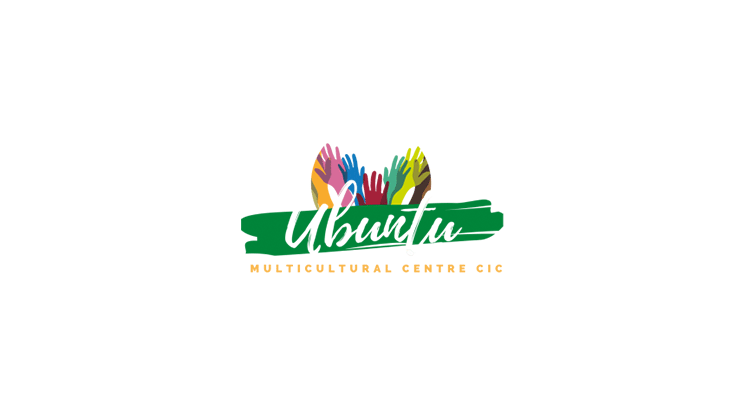
Ubuntu Multicultural Centre
This is a grassroots organisation born out of the collective efforts of community members in Middlesbrough. Founded by individuals passionate about social justice and community empowerment, Ubuntu embodies the spirit of solidarity and mutual support.
With a focus on promoting inclusivity and resilience, Ubuntu works tirelessly to address the needs of marginalised individuals and families, striving to create a more equitable and compassionate society.
We offer drop-in services providing advice, information, and support, as well as operate an Eco shop where residents can purchase 10 food items for £2, promoting affordability and sustainability.

Creative Minds
Founded in late 2013 by asylum seeking women, Creative Minds Middlesbrough is a women-only organisation dedicated to supporting women from all over the world, particularly those from refugee and asylum-seeking backgrounds.
Our mission is to provide a secure environment where women can connect, learn, and establish social support networks. Many of our attendees have endured trauma and loss.
Our vision is to promote community development, education, and poverty alleviation among asylum seekers and refugees in the Tees Valley, empowering them to shape policies and practices.
Our activities include walks, coffee mornings, dance, exercise, cooking, arts and crafts, reading clubs, life-saving training, and more. These gatherings facilitate interaction among members and newcomers, where we provide information, advocacy, and access to various support services
2. The Grant Fund
This report seeks to evaluate the effectiveness and impact of the co-produced grant fund.
The overarching aim of the grant fund was to:
Test whether a co-produced and collaborative approach to grant making can transform the lives of women and their children.
Timeline
- 2020 – 2021: As an offshoot from the Grant Makers Alliance – Turn2us, Buttle, and Smallwood Trust start to have exploratory discussion about what a collaboration could look like.
- Autumn 2021: The programme is committed to grantmaking and systems change.
- February 2022: Recruitment of Programme Manager. Steering Group explore seven shortlisted areas including Hull, Manchester, Birmingham, Middlesbrough. This was based on child poverty data, LWA schemes & where organisations were currently spending.
- March 2022: Context analysis on Middlesbrough completed and presented back to Steering Group. Decision taken to work in Middlesbrough. Discussions on how to engage with local partners – agreement that each org needs to receive in-principal agreement for funding from Board of Trustees.
- April 2022: Collaboration Statement put on websites.
Through the process of co-producing a grant fund we hoped to:
- Understand the impact of local grants on improving financial security of women and children (particularly on families who have been through the refugee/asylum systems).
- Understand the impact of co-produced grantmaking.
- Capture learning and understand the impact of working with local community referral partners.
How we developed the grant fund
Between January – July 2023 we worked with sixteen local women, and in partnership with our local partners, Ubuntu Multicultural Centre, Creative Minds Middlesbrough, alongside the Turn2us Insight and Impact team member and Local programmes team members to co-produce the grant fund.
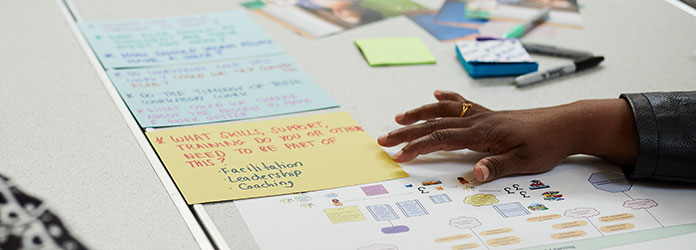
Workshop Activities:
We ran seven workshops and explored the following topics:
- Agreeing how the group would work together and make decisions.
- Identifying the causes of financial insecurity (not having enough money to live) for women and their children in Middlesbrough.
- Understanding what a grant could help with/could not help with.
- Designing the eligibility criteria, model of grant making and how the grant would be delivered.
- Deciding how the project would be evaluated.
- Thinking about how we could add value to what already exists and works within the community.
- Each workshop lasted four hours during which the group would spend time catching up, designing the grant and then having lunch together. We always ended with food as this was a powerful way to bring people together and build connections.
Outcomes of participating in the co-production workshops for our co-production partners included:
- Participation increased women’s confidence, reducing isolation and stress.
- Co-production encouraged community connection, new friendships and improved knowledge about available support.
- Shared decision-making empowered women in these communities, motivating change and improving financial literacy.
- Financial incentive (participants were paid £59 per session to attend)
About the grant fund
Buttle UK, the Smallwood Trust and Turn2us all use different language to describe the impact we want to have on people’s financial circumstances. However in the process of co-production the women told us that they wanted to use different language for what the grant fund would achieve. The resulting vision for the grant fund by our co-production partners was:
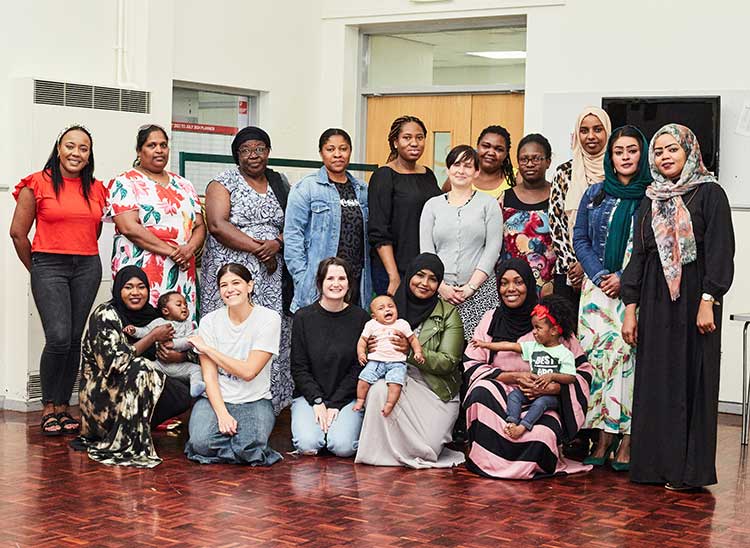
We want to see financially independent women and their children, who are happy and healthy, and who are able to reach their dreams.
What:
Over a 3-month period (September – December 2023) we gave out £50,000 in grants, each amounting to £2,000, to twenty-five women in Newport, Middlesbrough. All of the grant recipients were referred to a grant through Ubuntu Multicultural Centre, Creative Minds Middlesbrough.
Where:
The programme is being delivered in Newport, Middlesbrough. The most urbanised, diverse, and densely populated local authority in the Tees Valley region which faces significant socio-economic challenges that disproportionately impact women and children. The Newport ward of Middlesbrough is the 36th most deprived ward in England (IMD 2019)* and it has one of the highest levels of child poverty in the UK at 68%.
Who did the grant go to?
The women who received the grant were mainly from African, Indian, and other South Asian communities. They all had children aged between 5 months – 22 years old, and had firsthand experience with financial insecurity, having gone through the asylum and migrant systems.
How:
The grant was delivered in two stages through the community partners:
Stage 1:
- An initial £500 grant to cover essential costs.
- An optional Money Matters course was offered to support increased financial confidence and education. This was requested by the co-production partners when designing the grant fund.
Stage 2:
A second instalment of £1,500 with the aim of supporting families in transitioning from surviving to thriving.
3 About this evaluation
This report looks at how effective the Year 1 grant fund was and the impact it had in the Middlesbrough programme. As part of the grant co-production workshops, we held a session on designing the Monitoring, Evaluation and Learning framework.
We worked with local women to come up with how best to evaluate the grant, track the various experiences and learn from our findings. Together with the women we decided it would be best to collect data via a survey and interviews and for the findings to be written up in a report.
Overview of evaluation methods
The evaluation combines data from grant application forms, surveys and interviews:
25 application forms
(100% of women receiving a grant)
25 surveys
(92% of women receiving a grant participated via survey)
10 interviews
(40% of women receiving a grant participated)
Surveys and interviews took place eight to twelve weeks after people received the second instalment of the grant.
The survey had a mixture of ratings and open-ended questions on the impact of the grant, what was good about the process and what we could do better. Interview questions explored the same themes, and aimed to get a more in-depth understanding of people’s experiences.
Some of the women receiving grants were also involved in the co-design of the grant programme. We were keen to have a mixture of representation from people who designed the grant and people who did not. We had a 50/50 split for the interviews and a similarly equal split for the surveys.
4 Findings
Before the grant, 92% of people said the last time they were able to do something for themselves was more than three months ago. After the grant this reduced to 22%.
1. The grant met basic needs of women and their children.
I think this amount of money was great. It eased our life. But then, there is always more to do/achieve, but it was a perfect amount to start with.
We already know that a grant alone cannot help women achieve financial security and this was true for this grant, as the majority of the women said the grant only partially met their needs.
Most women spent the grant on essentials such as household items, clothing and items for the children’s education. Many people used the grants for trips out such as a family trip to a restaurant. People also spent the money on food, bills and paying off debt.
Things they weren’t able to afford before were: a party for their child, Christmas presents, sports club fees, and being able to buy new, rather than second hand household furniture.
The chart below compares how women described their financial situation before and after receiving the grant.
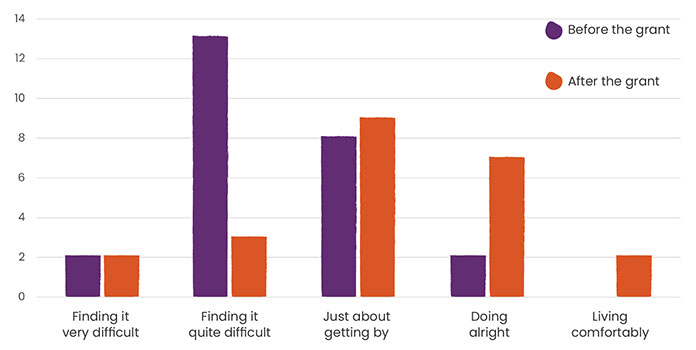
- The grant improved the majority of women's financial situation, however most women are still 'just about getting by'.
- Compared to before the grant was received, after the grant less women are 'finding things quite difficult' and more women are 'doing alright'.
- Two women would say they are 'living comfortably' now and two people are still 'finding it very difficult.
In the surveys and interviews, the women told us that other types of additional support they would like included:
- More money to meet more of their families’ basic needs and to fulfil hopes and dreams.
- Support with securing employment or setting up business.
- Increased financial literacy through training.
- The opportunity to apply for different grant amounts based on level of need.
Some women mentioned that high prices and not earning enough despite working were barriers to financial security.
I feel I have the ability to work, the grant only helps me to fix my immediate needs. A long term impact would be getting hired and having a job to have long term financial security.
2. The grants made a positive difference to the wellbeing of the women and their children.
Yes, when you know you are debt free you can finally sleep and gives you peace of mind. Being tight on budget gives you a headache, and you can’t live freely. One thing with debt, you accumulate interest and it’s a ripple effect, having that cleared out is a way for me to contain my finances and plan better. Even if you don’t have a lot of money just not having debt gives you peace and confidence. It made a very big impact.
Women talked about the stress of being behind on bills or having a big expense such as a visa renewal. Another person said that not being able to buy things made them feel ‘really depressed’.
After the grant we asked whether there had been any changes for people’s wellbeing as a result of the grant. Two people in the interviews talked about feeling a sense of ‘relief’ and one person said paying off debt gave them ‘peace of mind’.
Just being able to go out to eat as a family is such a good feeling and creates a bond, we feel much more free and no more tightness.
3. Improvement to children’s wellbeing and family relationships
Some of the women used the grant for clothing, kids' activity fees and equipment, and even an air fryer for cooking. All of these things have had a positive effect on the children's wellbeing.
They feel better when they are going to school because I got them new warm clothes.
In the survey, 56% of people said the grant had made their children happy.
It made them happier. They have not been anywhere probably in about eight years for more than a day. They are still talking about their trip and how fun it was.
The feedback shows how being able to afford essential items for children has a positive effect on their wellbeing.
Many people also said how much the children enjoyed trips out, something many people couldn't afford to do before. Being able to take part in sports clubs and trips out is also positive for the children’s social development.
During the interviews, women talked about how activities like going to a restaurant together helped with family bonding and made the kids happy. Another person shared how going on school trips...
...has really boosted their confidence and happiness to be able to participate in those events. It has really improved our relationship.
4. Impact on how the women think about their future
The grant made women feel better about the future. Some felt hopeful, optimistic, or confident.
Being a single mother, I was always worried about saving money because what we get is not sufficient for our family. So getting this money all together, gave me confidence about the future.
Others said they started saving and being more strategic about how they spend their money. Additionally, some mentioned pursuing training or courses and considering job opportunities. However, one person found thinking about the future quite challenging.
5. The community partners, Ubuntu and Creative Minds Middlesbrough, improved the experience for people and were vital in connecting to communities.
I struggled a lot on the form and found it mentally tasking, so Ubuntu helped me with the forms. When it gets too much, I get really worked up with reading. It wasn’t as stressful as I thought it was and I didn’t think I'd get the amount I asked for, but I did.
Creative minds give me a lot of support, physical and mental.
The ladies assisted us. We got some advice filling the forms. Some of us didn't know how to read and write, and they would sit down with you and read it through with you. It was easy.
Six people in the survey and five during the interviews highlighted the importance of partner support during the grants process.
Partners helped by explaining how the grant works, assisting with forms, staying in touch throughout the process, and answering questions. Partners also supported several people where English is their secondary language.
6. Feedback on the grants process
Grant recipients expressed overall satisfaction with the grants process throughout; however, the feedback provided comes from a subset of respondents.
What worked well:
- Six out of twenty-two people completing the survey said their experience of the grant was easy and straightforward - this was true both in standalone applications and for women that asked for support from the community partners.
- Two people completing the survey said they received the grant quickly and one person said they appreciated the freedom to choose how to spend the grant.
- Two respondents appreciated the survey's non-invasive approach, finding it to be stress-free.
What could have been better:
- The grant application could be translated into other languages to make it more accessible to women who do not speak English or with additional language needs.
- Some of the women thought that payments could have been structured differently, including monthly payments.
- Additional follow up required for women to provide more personalised support.
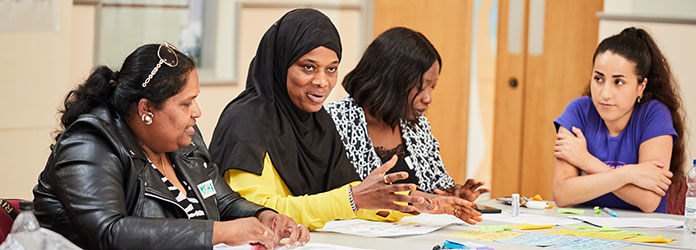
5. What did we learn and what will we do differently?
Learning:
Co-production isn’t necessary for all elements of programme design. Specifically, in the design of the grant fund, where the expertise and experience of collaborating organisations meant that efficient and effective grant-making was already in place.
Do differently:
Selective use of co-production in areas where it adds the most value and leveraging the expertise of all partners (co-production partners, community partners and collaborating organisations) involved, recognising the unique strengths and expertise that each partner brings to the table.
Learning:
Our community partners didn’t know what co-production would entail when we first approached them but trusted us enough to go along with the process.
Do differently:
Clear communication about programme objectives, processes, and expectations to prevent misunderstandings and build stronger partnerships.
Learning:
Managing relationships across multiple organisations requires dedicated time and effort. The process took much longer than we thought. Fixed meeting schedules, operational plan alignment, and consistent engagement are vital for maintaining equal participation and ownership.
Do differently:
Be more realistic about the timescales of delivering a multi-stakeholder programme like this, including the amount of time it takes to build trusting relationships with new partners.
Learning:
Putting trust in community partners helped the collaboration to understand gendered and child poverty, immigration status and financial insecurity from the perspective of the women. The partners also helped engage residents and to build their trust in the collaboration.
Do differently:
Working collaboratively with Ubuntu Multicultural Centre and Creative Minds Middlesbrough was intrinsic to the programme and it could not have happened without them. But we needed to be clearer about the timescales involved, short term funded projects are not always beneficial for community organisations.
Learning:
Power dynamics. A group of large funders working with smaller community organisations meant that there were power dynamics at play.
While we provided crucial financial support to our partners and the women they supported, we also required them to participate in activities that sometimes stretched their capacity. This example highlights the power imbalance and its potential impact on our collaboration’s effectiveness and sustainability.
Do differently:
Acknowledge and address the power dynamics that exist and implement strategies to ensure that decision-making processes are more equitable and inclusive.
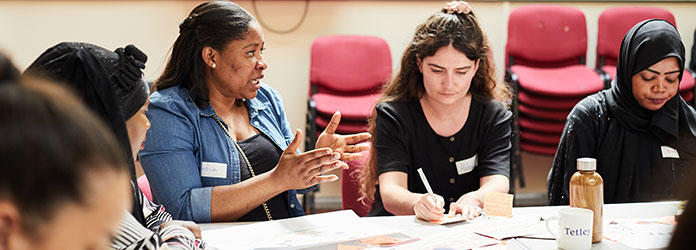
6 Conclusion
The grant is making progress towards its aims in the following ways:
- It’s shifting power to local women, by actively involving women experiencing gendered poverty in decision-making processes, empowering them to shape interventions that address their specific needs.
- Co-production techniques have been central to the programme and evaluation design, ensuring that the voices and experiences of women and their children inform every aspect of the initiative.
- The programme has prioritised reaching and serving marginalised communities, particularly those facing multiple intersecting forms of disadvantage, with all year one grant recipients being women with children who have gone through the refugee or asylum systems.
- While the grants are not the sole aspect of the programme, they have been the primary tool, playing a central role in the co-production process and in addressing the financial security of the women and children involved.
- Learnings captured about co-produced grant-making have helped us to understand that it enhances participants' confidence, skills, and community connections. Although co-production requires more time and resources, its impact justifies the investment.
- The programme has actively captured learnings from working with local community referral partners, recognising their vital role in supporting women to gain trust for the collaboration and throughout the grant process.
The Middlesbrough Collaboration will continue to:
Work with the women and community partners to unpick systemic causes of financial insecurity, and to better understand how the grant, and the other aspects of the programme, could help to meet their aspirations for financial independence.
Future focus:
There are plans in place already to begin addressing this through the outcomes and recommendations of the systems mapping workshops, which built on the initial causes of gendered and child poverty mapped during the design of the Local Grant Fund. Early emerging themes include childcare, jobs and food.
Influence other grant makers to work in a way that shifts power and centres lived experience.
Future focus:
This evaluation report, a detailed report on the collaboration of the three grant-making charities and the impact of co-production will be shared with other grant-making organisations and local decision-makers.
Hearing more from children and young people about their experiences of poverty and the impact of grants.
Future focus:
The Programme Manager will collaborate with Buttle UK's Youth Engagement and Co-Production Manager to design and facilitate co-production sessions with young people, focusing on discussions about poverty and the impact of grants.
Further reports from our Middlesbrough collaboration
Understanding what causes poverty for women and their children in Middlesbrough